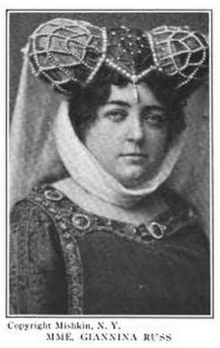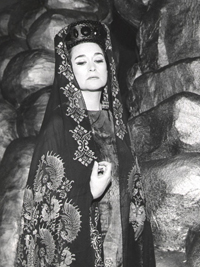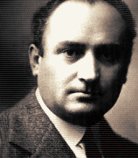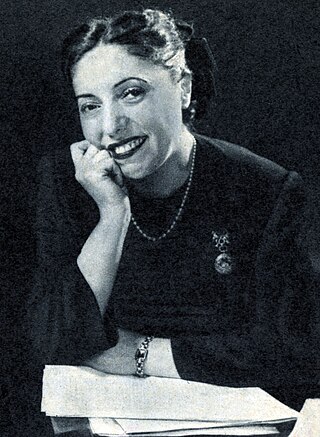
Giannina Russ was born on 27 March, 1873 in Lodi. She was an Italian operatic soprano, particularly associated with the Italian repertory. She died on 28 February, 1951 in Milan.

Giannina Russ was born on 27 March, 1873 in Lodi. She was an Italian operatic soprano, particularly associated with the Italian repertory. She died on 28 February, 1951 in Milan.
Russ studied piano and voice at the Milan Music Conservatory with Leoni. She made her debut in Bologna, as Mimi in 1903, at La Scala in 1905, as Aida, and in Florence in 1908, as Norma. [1]
She was quickly invited abroad, making debut in 1904 at both the Royal Opera House in London, and the Monte Carlo Opera, also appearing at the Teatro Colón in Buenos Aires, and the Manhattan Opera Company in New York, in 1907. [2]
Russ performed in a wide range of roles, from bel canto to verismo, her repertory included; Semiramide, Giulia, Amaltea, Paolina, Abigail, Elvira, Leonora, Amelia, Wally, Gioconda, Santuzza, etc. [3]
She possessed a beautiful and grand voice, if somewhat uneven, and a strong dramatic temperament. She enjoyed more success in Latin countries than in Anglo-Saxon countries. After retirement, she became a respected voice teacher. Amongst her pupils were Margherita Grandi and Clara Petrella.

Ayşe Leyla Gencer was a Turkish operatic soprano.

Magda Olivero, was an Italian operatic soprano. Her career started in 1932 when she was 22, and spanned five decades, establishing her "as an important link between the era of the verismo composers and the modern opera stage". She has been regarded as "one of the greatest singers of the twentieth century".
Ebe Stignani was an Italian opera singer, who was pre-eminent in the dramatic mezzo-soprano roles of the Italian repertoire during a stage career of more than thirty years.

Nelly Miricioiu is a Romanian-born British operatic soprano singing a large repertoire ranging from bel canto to verismo.

Anita Cerquetti was an Italian dramatic soprano who had a short but meteoric career in the 1950s. Her voice was very powerful and pleasing to audiences.

Viorica Cortez is a noted Romanian-born mezzo-soprano, later French by naturalisation. Starting her operatic and concert career in the mid-1960s, she went on to become one of the most prominent female performers of the '70s and '80s. An example of professional longevity, she is present on some of the most prestigious European opera scenes.

Roberto Stagno was a prominent Italian opera tenor. He became an important interpreter of verismo music when it burst on to the operatic scene during the 1890s; but he also possessed an agile bel canto technique which he employed in operas dating from earlier periods. In 1890, he created the pivotal verismo role of Turiddu.

Maria Caniglia was one of the leading Italian spinto sopranos of the 1930s and 1940s.

Mercedes Capsir was a Catalan opera singer, a high coloratura soprano, particularly associated with light Italian roles, such as Lucia and Gilda.

Francesco Merli was an Italian opera singer, particularly associated with heavy roles such as Otello, Canio and Calaf. He ranks as one of the finest dramatic tenors of the inter-war period.

Maria Nemeth was a Hungarian soprano, particularly associated with the Italian repertory, one of the leading dramatic sopranos of the inter-war period.

Pia Tassinari was an Italian soprano and later mezzo-soprano, particularly associated with the Italian and French repertories.

Clara Petrella was an Italian operatic soprano, particularly associated with the Italian repertory, an outstanding singing-actress nicknamed the "Duse of Singers".

Carla Gavazzi was an Italian operatic soprano, largely based in Italy, and particularly associated with the verismo repertory.
Giannina Arangi-Lombardi was a prominent spinto soprano, particularly associated with the Italian operatic repertory.

Adelina Stehle was an Austrian-born operatic soprano, associated almost entirely with the Italian repertory. She studied singing in Milan and debuted as Amina in 1881 in Broni in Lombardy. Her career eventually brought her to La Scala in 1890 where she flourished. She took part in a series of important premieres in the 1890s. In 1893 she was the first Nannetta in Verdi's Falstaff to the Fenton of her husband, Edoardo Garbin, and they were later important in the popularization of Puccini's La bohème.

Eugenia Burzio was an Italian operatic soprano known for her vibrant voice and passionate style of singing. She was particularly prominent in the verismo repertoire, creating the role of Delia Terzaghi in Ruggero Leoncavallo's Goffredo Mameli as well as singing Minnie in the Italian premiere of Giacomo Puccini's La fanciulla del West but was also admired in Verdi and other 19th century repertoire. While many music critics found her interpretations imaginative and exciting, others criticized her for the unevenness of her voice and other technical shortcomings.

Celestina Boninsegna was an Italian operatic soprano, known for her interpretations of the heroines in Verdi's operas. Although particularly eminent in Verdi's works, she sang a wide repertoire during her 25-year career, including Rosaura in the world premiere of Mascagni's Le maschere. Boninsegna made many recordings between 1904 and 1918, and her voice was one of the most successfully captured on disc during that period.
Mario Basiola was an Italian operatic baritone.

Lynne Strow Piccolo is an American soprano, particularly associated with the spinto roles of the Italian operatic repertoire.
Le guide de l'opéra, les indispensables de la musique, R. Mancini & J-J. Rouvereux, (Fayard, 1986), ISBN 2-213-01563-5